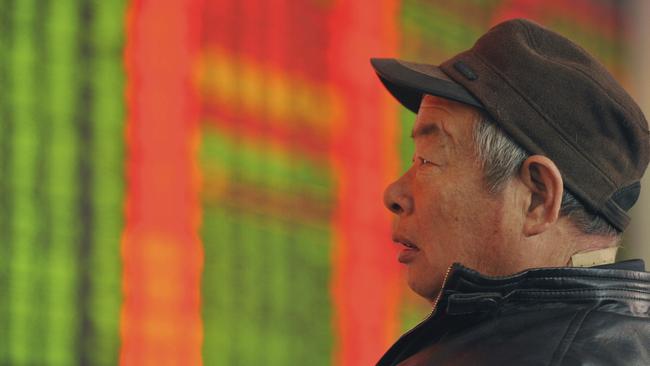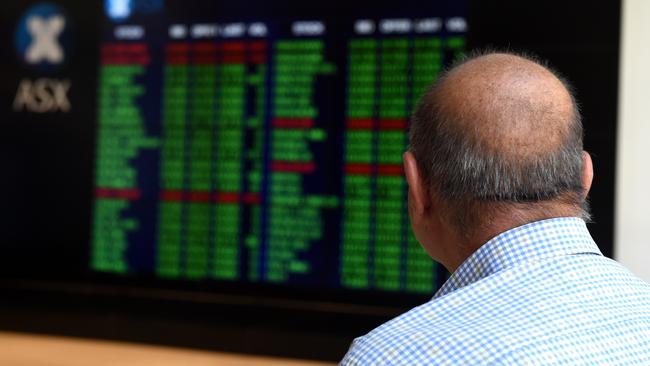China shares plunge 6.4 per cent
CHINESE investors have embarked on another wave of panic selling overnight — and analysts warn there’s more pain to come.

THE Australian share market has opened lower despite solid leads from markets overseas.
Phillip Capital senior client adviser Michael Heffernan said the local bourse was having a perplexing start on Wednesday.
“It’s a bit of a confounding start to the day, given the worldwide wave of green that we saw last night in both Europe and the US,” Mr Heffernan said.
“The oil price was going up, so the indications were we should be well oiled for a good start.
“It’s a disappointing start but that might change over the day.”
At 1034 AEDT, the benchmark S&P/ASX200 index was down 24.1 points, or 0.48 per cent, at 4,982.5 points.
In the resources sector at 1026 AEDT, global miner BHP Billiton was up three cents at $15.31, Rio Tinto dipped 27 cents to $38.89, and Fortescue Metals sagged five cents to $1.47.
In the energy sector, oil and gas producer Woodside Petroleum fell 55 cents to $25.87, and Santos lost nine cents to $2.87. Oil Search reversed six cents to $6.22 after it reported a 10 per cent decline in quarterly revenue on the back of a sharp fall in oil and gas prices, despite an increase in total production.
Among the major banks, Westpac was down nine cents at $30.82, Commonwealth Bank retreated 48 cents to $78.52, National Australia Bank gave away 41 cents at $27.35, and ANZ Bank surrendered 13 cents to $24.02.
Among other stocks, Australian data management firm Recall Holdings was off nine cents at $6.19 after it bought Swiss document storage and management company Secur Archiv.
Domino’s Pizza weakened 35 cents to $59.54 after it completed its 35 million-euro ($A54.15 million) acquisition of 89 Pizza Sprint stores in France.
On Wall Street on Tuesday, the Dow Jones Industrial Average jumped 282.01 points, or 1.8 per cent, to 16,167.23 points as the price of oil increased almost four per cent after falling sharply the day before.
Local inflation figures released midmorning showed Australia’s inflation rate rose 1.7 per cent over the year to the December quarter.
The consumer price index rose 0.4 per cent in the quarter, beating market expectations, figures from the Australian Bureau of Statistics on Wednesday showed.
Underlying inflation, which strips out volatile price movements, was 2.0 per cent over the year, after a quarterly rise of 0.55 per cent.

SHANGHAI STOCKS PLUMMET
Shanghai stocks slumped more than six per cent by the close on Tuesday, ending a two-day rally, on “panic selling” driven by worries over China’s slowing economy and weaker global growth.
The benchmark Shanghai Composite Index tumbled 6.42 per cent, or 188.72 points, to 2,749.79 on turnover of 212.6 billion yuan ($32.4 billion).
The Shenzhen Composite Index, which tracks stocks on China’s second exchange, plunged 7.12 per cent, or 131.36 points, to 1,714.42 on turnover of 310.5 billion yuan.
Hong Kong sank 2.48 per cent, or 479.34 points, to 18,860.80. Analysts said sentiment was hurt by big losses on Wall Street, where all three main indexes sank more than one per cent owing to tumbling oil prices.
The sharp sell-off came despite the People’s Bank of China pumping 440 billion yuan ($67 billion) into the money market, seeking to ease tight liquidity ahead of the Lunar New Year holiday, when demand for funds surges.
The injection through the regular open market operations of the central bank was the largest since 2013, Bloomberg News reported.
“Some investors have no desire to continue fighting before the upcoming holiday, so the market is quite vulnerable to external factors. Once the drop deepened, investors went (into) panic-selling,” Zheshang Securities analyst Zhang Yanbing told AFP.
“Even though the central bank injected funds, this money won’t necessarily go into the stock market,” he added.
Some analysts have likened the latest injections to a loosening of monetary policy or a replacement of funds lost to capital outflows.
China’s economy grew 6.9 per cent last year, its slowest rate in a quarter of a century, raising hopes of further monetary loosening.
China’s securities regulator last week announced seven companies would launch initial public offerings (IPOs) for listing in Shanghai and Shenzhen.
They are the first under new rules that drop a requirement for subscriptions to be paid in advance, a move aimed at curbing market volatility.
But Haitong Securities analyst Zhang Qi told AFP: “Fluctuations in global markets, weak fundamentals and the continuation of new share offerings all weighed on the market.
“The market is already in a downward spiral, so investors tend to be over pessimistic and all negative effects are amplified.”



